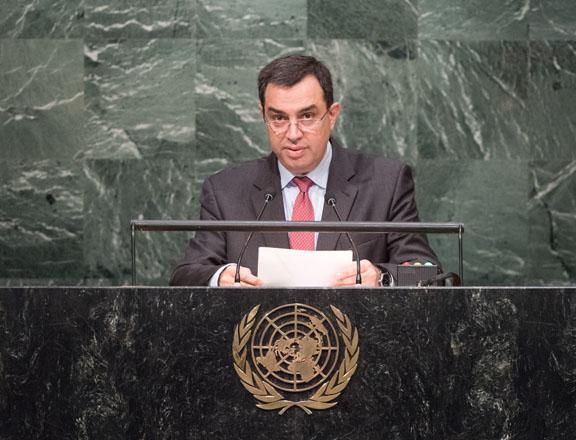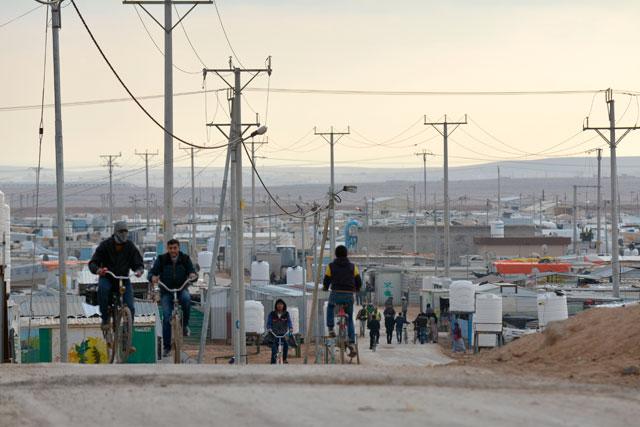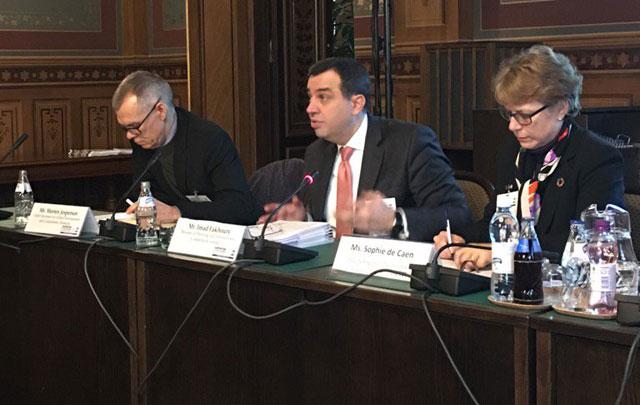You are here
Conflicts to affect region's development for decades to come – Fakhoury
By Rand Dalgamouni - Sep 27,2015 - Last updated at Sep 28,2015

Minister of Planning and International Cooperation Imad Fakhoury speaks at the UN Sustainable Development Summit 2015 in New York on Saturday (Photo courtesy of Planning Ministry)
UNITED NATIONS — As world leaders adopted a 15-year global plan “to end poverty, reduce inequalities and protect the environment”, Jordan said challenges in the Middle East will continue to affect the region’s sustainable development efforts for the coming years.
“Turbulence in the region has generated a number of humanitarian crises … their negative impact will continue to affect our region’s sustainable development agenda for the next decade at the least,” Planning and International Cooperation Minister Imad Fakhoury told the United Nations General Assembly on Saturday.
Speaking at the UN Sustainable Development Summit 2015, a day after the General Assembly’s unanimous adoption of a new 15-year development agenda, Fakhoury said these crises require political solutions and “firm international commitments” to mitigate their impacts.
The global plan, titled “Transforming our world: the 2030 Agenda for Sustainable Development”, is made up of 17 goals and 169 targets to come into effect on January 1, 2016, replacing the Millennium Development Goals set in 2000, according to a UN statement.
Highlighting Jordan’s commitment to sustainable development, the minister gave an overview of the Kingdom’s reform efforts over the past few years to increase citizens’ participation in decision making, from constitutional amendments to the recently drafted elections bill.
"Additionally, as part of our efforts to enhance transparency, good governance and fighting corruption, a National Royal Commission adopted a National Integrity Charter and its action plan, which is being tracked by this independent commission, and Parliament is deliberating a new integrity, ombudsman and anti-corruption law as one of key recommendations of this commission,” he said.
Fakhoury also mentioned economic reform laws such as the new laws on public-private partnership, tax, electronic transactions and investments.
"2015 also witnessed the successful completion of an IMF Stand-by Arrangement programme by Jordan and the country elected to start a new IMF Extended Fund Facility programme to continue structural reforms from 2016 onwards,” the minister said, pointing to other challenges that Jordan is currently facing because of regional spillovers.
Syrian refugees
As the Syrian crisis, now in its fifth year, forced four million to take refuge in neighbouring countries and internally displaced eight million people, Fakhoury said the situation for Jordan goes beyond being a refugee influx, describing it as a “national resilience issue”.
Jordan, now a temporary home for 1.4 million Syrians, he added, is the third largest refugee-recipient country per capita in the world.
“This has heavily impacted the country’s fiscal position, as since 2011, the overall estimated financial impact of the crisis … is about $6.6 billion,” Fakhoury said, highlighting the Jordan Response Plan (JRP) to address the issue, developed in cooperation with the international community and the UN.
“Currently, the required $2.99 billion in the plan for 2015 is extremely underfunded… Only 35 per cent of JRP needs have been funded or pledged which has been the highest level so far, indicating that for the fourth consecutive year, two-thirds of the needs at a minimum remain unfunded,” the minister said.
Warning that “Jordan has reached the saturation level”, he noted that the Kingdom has started coordination with UN agencies and donors to prepare the response plan for 2016-2018, expected to be launched by the end of this year.
This burden borne by Jordan is affecting the key sectors of education, health, water, municipal services and infrastructure, according to Fakhoury.
“In this regard, I would like to emphasise the importance of Jordan’s efforts to support Syrian refugees and host communities, and the importance of sustaining and expanding investment in supporting Jordanian efforts,” he said, noting that this “would contribute to the security and stability of our region, Europe and the world”.
“We should emphasise here that the spread of the effects of this crisis beyond the region would lead to quadrupling of its financial and social costs at a minimum, which can otherwise be remedied and limited by investing the necessary funding and support for national institutions and host communities, treating Jordan as the first line of defence, not only for the region but for the whole world,” the minister added.
Stressing that the flow of “illegal immigrants” to Europe is becoming a concern despite the advanced economies of European countries, he said this shows Jordan’s pivotal role by continuing to shoulder the refugee burden despite its scarce resources.
“Some countries talk of hosting a limited number of refugees per year, while Jordan has received this same number every one or two days during the peak of the flow of Syrian asylum seekers to Jordan,” Fakhoury noted.
With Syrians now constituting 20 per cent of the Kingdom’s population, he said this would be equivalent to “the US having to absorb 64 million immigrants, or the EU having to absorb 100 million immigrants”.
The minister called for improving “the eligibility criteria for vulnerable middle-income countries to access development assistance and highly concessional and innovative funding tools” to ensure the implementation of the UN-endorsed Sustainable Development Goals.
He also stressed the need for “more coordinated partnership from national governments, donors, multi-lateral institutions, the private sector and civil society organisations” to facilitate the achievement of these goals.
“The true test of commitment to agenda 2030 will be implementation,” the UN statement quoted Secretary General Ban Ki-moon as saying, stressing the need for action from all states.
The agenda, he said, also requires global partnership involving all stakeholders, including parliaments, local governments, civil society and academia. No one can succeed working alone.
Related Articles
AMMAN — The government of Jordan and the international community on Thursday endorsed the Jordan Response Platform (JRP) for the Syria Crisi
AMMAN — Planning and International Cooperation Minister Imad Fakhoury has participated in an international conference in Helsinki to discuss
AMMAN — Minister of Planning and International Cooperation Imad Fakhoury on Saturday said that donor countries and organisations have so far



















